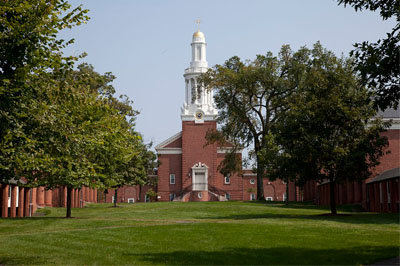 The Sterling Memorial Quadrangle and Marquand Chapel sits at Yale Divinity School in New Haven, CT. PHOTO/Carol M. Highsmith, via Wikimedia Commons[/caption]Yale University, founded in 1701, has come a long way since its inception – a long way from its founding roots in the Christian faith and ministry. Although you still see the impressive, gothic-looking chapel there are not just Christian chaplains on campus, but also a Hindu life advisor, a coordinator of Muslim life, an assistant chaplain who coordinates outreach to other faiths, and a kind of humanist chaplain.
The Sterling Memorial Quadrangle and Marquand Chapel sits at Yale Divinity School in New Haven, CT. PHOTO/Carol M. Highsmith, via Wikimedia Commons[/caption]Yale University, founded in 1701, has come a long way since its inception – a long way from its founding roots in the Christian faith and ministry. Although you still see the impressive, gothic-looking chapel there are not just Christian chaplains on campus, but also a Hindu life advisor, a coordinator of Muslim life, an assistant chaplain who coordinates outreach to other faiths, and a kind of humanist chaplain. Yale Alumni Magazine recently featured a front page article entitled “When Is Church Not Church? The Humanist Path to Community.” Within this cover story were these big and bold letters: “With a charismatic young leader … humanists are building a community that looks a little bit like church.”
This leader, funded by a former graduate of Yale, calls himself the humanist community’s executive director. Although this 29-year-old humanist was born into a non-religious family in the midwest he was invited to an evangelical church and was seemingly converted. However, there was “one problem” – he saw himself as a homosexual. While attending a Lutheran college he became convinced that God did not exist. After he read a book by a humanist chaplain at Harvard entitled Good Without God: What a Billion Nonreligious People Do Believe he found his way to Harvard and its humanist ministry which was started by a lapsed Catholic priest about 40 years ago.
While there he wrote a book entitled Faitheist: How an Atheist Found Common Ground with the Religious, which gave him a forum to discuss what “he and those like him didn’t – and did believe." Now he is busy trying to build a Yale humanist community by organizing group discussions, offering counseling, performing weddings, visiting the sick and suffering, and having a Sunday meeting where the 20 in attendance “listened to a sermon of sorts on how to improve their world.”
He has found enough common ground at the divinity school for the Yale humanist community to become approved as an internship site at the school. I laughed when I read how one of his attendees said she wouldn’t mind if the Sunday meeting was a bit more “churchier” and enhanced with music.
What are the lessons that these humanists are teaching us? First, we are living in challenging times when groups like this are not only finding recognition on what were once overtly Christian campuses but also campaigning for humanist chaplains in the military and elsewhere. The article mentions how a recent survey of college freshman discovered that one-quarter identified as nonreligious (more than twice the number of 11 percent in 1973). Such developments need to keep us on our toes and our knees.
Perhaps the second lesson is sad, awfully sad. It is sad to think that there is no praying, no connecting with God, no confessing one’s sins, no asking God for help in helping the hurting, no sensing the presence of God and knowing He hears and cares! It is sad to think that this community has no hope for life beyond this life, no hope in the face of death, and nothing particularly encouraging to say standing over an empty grave or not far from a crematorium.
It is sad to think that there is no worship through praise and music that lifts people up and out of themselves toward God and each other. Although there is talk about living “meaningful, ethical lives capable of adding to the greater good of humanity,” it is sad to think that there is no clear and definite, higher-than-high standard of behavior as embodied in the incomparable life and death of Jesus Christ.
It is sad to think that there is no Communion/Lord’s Supper, no burying the self in Baptism, no Christmas celebration with Christmas carols and programs, and Easter/Resurrection for them. It is sad to think that there is no Spiritual impetus for people in this community to be better than they may want to be, yet need to be! Is there any talk of down-and-dirty mission outreach?
While it is sad to think about what this community does not have, it is also a joy to think about what our churches have, and it is a joyous opportunity for us to appreciate and fully utilize what we have because of Christ and our faith in Him!
Lord, Thank You for reminding me of what a precious and priceless community the church is where we can pray, worship, study, give, serve, be encouraged, challenged, and comforted together as Your Loving and Forgiving Spirit equips and empowers us to be what You would have us be! In Christ’s Name we pray. Amen.